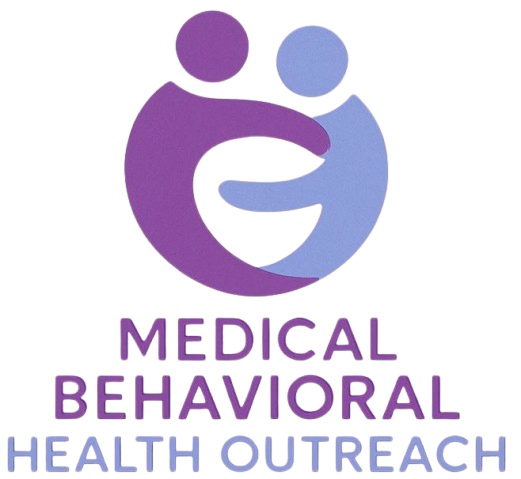Specialized Care for Mental Health Conditions
We understand that mental health challenges affect people in different ways. Whether you are experiencing overwhelming stress, mood changes, or difficulty focusing, our team is here to provide compassionate care and evidence-based treatment.

Depression
Depression is more than just feeling sad—it’s a serious medical condition that affects millions of Americans every year. If you’re experiencing persistent feelings of sadness, hopelessness, or emptiness that last for weeks or months, you may be dealing with clinical depression.
Common symptoms include loss of interest in activities you once enjoyed, changes in appetite or sleep patterns, fatigue, difficulty concentrating, and sometimes thoughts of self-harm. Depression can affect anyone regardless of age, gender, or background, and it’s nothing to be ashamed of.
At MBHO, our experienced providers use evidence-based treatments including therapy and medication management to help you overcome depression. We understand that every person’s experience is unique, and we’ll work with you to develop a personalized treatment plan that addresses your specific needs and goals.
Recovery is possible. With the right support and treatment, you can regain joy, motivation, and hope for the future.
Anxiety Disorders
Anxiety becomes a disorder when worry, fear, or panic interferes with your daily life, relationships, or work. While everyone experiences anxiety sometimes, clinical anxiety disorders involve excessive, persistent worry that’s difficult to control and disproportionate to the actual situation.
You might experience physical symptoms like rapid heartbeat, sweating, trembling, or shortness of breath. Mental symptoms include racing thoughts, difficulty concentrating, irritability, and feeling like something terrible is about to happen. Some people develop specific phobias or panic disorder with sudden, intense episodes of fear.
Our providers specialize in treating various anxiety disorders including generalized anxiety disorder, social anxiety, panic disorder, and specific phobias. We use proven therapeutic techniques and medication when appropriate to help you manage anxiety effectively.
With proper treatment, you can learn to control anxiety rather than letting it control you. Many of our patients see significant improvement in their symptoms and quality of life within just a few months of starting treatment.
PTSD (Post-Traumatic Stress Disorder)
PTSD can develop after experiencing or witnessing a traumatic event such as military combat, physical or sexual assault, accidents, natural disasters, or the sudden death of a loved one. It’s a normal response to abnormal circumstances, and seeking help is a sign of strength, not weakness.
Symptoms often include intrusive memories or flashbacks, nightmares, emotional numbness, avoiding reminders of the trauma, hypervigilance, and difficulty sleeping. You might feel disconnected from friends and family or struggle with anger and irritability.
Our trauma-informed approach recognizes the widespread impact of trauma and prioritizes your safety and healing. We use specialized therapies proven effective for PTSD, including cognitive processing therapy and EMDR when appropriate. We also provide medication management to help with symptoms like sleep problems and anxiety.
Healing from trauma takes time, but recovery is absolutely possible. Our compassionate providers will support you at your own pace as you process your experiences and develop healthy coping strategies.
Bipolar Disorder
Bipolar disorder involves extreme mood swings that alternate between emotional “highs” (mania or hypomania) and “lows” (depression). These aren’t just normal ups and downs—they’re intense episodes that can last days, weeks, or months and significantly impact your life, relationships, and ability to function.
During manic episodes, you might feel euphoric, have increased energy, need less sleep, talk rapidly, make impulsive decisions, or engage in risky behaviors. Depressive episodes bring feelings of sadness, hopelessness, fatigue, and sometimes thoughts of suicide. Some people experience mixed episodes with symptoms of both mania and depression.
Managing bipolar disorder typically requires a combination of medication and therapy. Our psychiatric providers work closely with you to find the right mood stabilizers and monitor your progress. We also provide therapy to help you recognize early warning signs, develop coping strategies, and maintain stability.
With proper treatment and support, people with bipolar disorder can live full, productive lives. The key is working with experienced professionals who understand the condition and are committed to your long-term wellness.
ADHD (Attention-Deficit/Hyperactivity Disorder)
ADHD affects both children and adults, making it difficult to focus, sit still, or control impulsive behaviors. Many adults don’t realize they have ADHD until their children are diagnosed, or until work and life demands reveal underlying attention and organization challenges.
Symptoms include difficulty concentrating or following through on tasks, being easily distracted, fidgeting or restlessness, talking excessively, interrupting others, and struggling with organization and time management. These symptoms must be present in multiple settings and significantly impact your daily functioning to qualify for an ADHD diagnosis.
Our comprehensive ADHD evaluations include detailed interviews, symptom rating scales, and sometimes psychological testing to ensure an accurate diagnosis. Treatment often includes medication management combined with behavioral strategies and skills training.
Many people find that proper ADHD treatment dramatically improves their quality of life, relationships, and performance at work or school. With the right support, you can learn to manage symptoms and leverage your unique strengths.
Schizophrenia
Schizophrenia is a complex mental health condition that affects how you think, feel, and perceive reality. While it’s often misunderstood, schizophrenia is a treatable medical condition, not a character flaw or something you can simply “snap out of.”
Symptoms may include hallucinations (seeing or hearing things others don’t), delusions (false beliefs), disorganized thinking or speech, and changes in behavior or emotions. Some people also experience “negative symptoms” like reduced emotional expression, decreased motivation, or social withdrawal.
Early intervention and consistent treatment are crucial for the best outcomes. Our psychiatric providers specialize in managing schizophrenia using the latest medications and therapeutic approaches. We focus on reducing symptoms, preventing relapses, and helping you maintain the highest possible quality of life.
Recovery looks different for everyone, but many people with schizophrenia can live independently, maintain relationships, and pursue meaningful activities with proper treatment and support. We’re here to provide that support every step of the way.
Obsessive-Compulsive Disorder (OCD)
OCD involves unwanted, intrusive thoughts (obsessions) and repetitive behaviors or mental acts (compulsions) that you feel driven to perform. These obsessions and compulsions are time-consuming, distressing, and interfere with your daily life and relationships.
Common obsessions include fears about contamination, harm coming to yourself or others, religious or moral concerns, or needing things to be “just right.” Compulsions might include excessive cleaning, checking behaviors, counting, arranging items in specific ways, or mental rituals like repeating words or phrases.
The good news is that OCD is highly treatable. Our providers use evidence-based approaches including cognitive-behavioral therapy (CBT) and exposure and response prevention (ERP) therapy. Medication can also be helpful for many people with OCD.
You don’t have to live trapped by OCD thoughts and behaviors. With proper treatment, you can learn to manage symptoms and reclaim control over your life.
Eating Disorders
Eating disorders are serious mental health conditions that involve unhealthy relationships with food, eating, and body image. They affect people of all ages, genders, and backgrounds and can have serious physical and emotional consequences if left untreated.
Common eating disorders include anorexia nervosa (restricting food intake), bulimia nervosa (binge eating followed by compensatory behaviors), and binge eating disorder (frequent episodes of eating large amounts of food with feelings of loss of control).
These disorders are often accompanied by depression, anxiety, and low self-esteem. They typically require specialized treatment that addresses both the psychological and physical aspects of the condition.
Our providers work closely with other healthcare professionals including medical doctors and nutritionists to provide comprehensive care. Treatment typically includes therapy to address underlying emotional issues, nutritional counseling, and sometimes medication to treat co-occurring conditions.
Recovery from an eating disorder is possible with the right support and treatment. We’re here to help you develop a healthy relationship with food and your body.
Ready to Take the First Step?
Your mental health matters, and help is just a click away. Schedule your initial consultation today and
start your journey toward better mental wellnes
